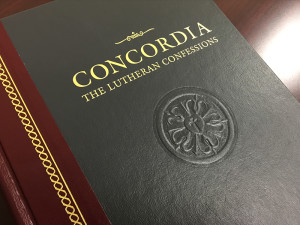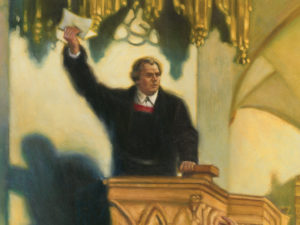by Rev. Michael Schuermann

“What has been is what will be, and what has been done is what will be done, and there is nothing new under the sun.” (Ecclesiastes 1:9)
A student of the history of Christ’s Church will discover that these words of Solomon ring true from age to age. During the Reformation, the Lutheran reformers confessed the truth of God’s Word over against the errors found within the medieval Roman church, but they also saw fit to confess against false teachings that had come into use by the followers of other, more radical contemporary reformers.
One of these groups following false teachers was the Anabaptists. Their teachings are explicitly condemned in five separate articles within the Augsburg Confession. Later, when the Formula of Concord was written, the writers saw fit to include a final twelfth article which included a listing of the erroneous teachings of various groups, including the Anabaptists.
Why was this done? The false teachings of the radical reformers had often been lumped together with the teachings of the Lutherans or the Lutherans were often blamed for the emergence of such sects which distorted the Word of God. At Augsburg in 1530, Johann Eck accused the Lutherans of various false teachings which were in fact teachings of the Anabaptists (hence the specific condemnation of Anabaptistic teaching by the Lutheran in the Augsburg Confession).
Later, when the Formula of Concord was written, the authors’ goal was to only confess what was believed, taught, and confessed within the Lutheran Church. However, because the false teachings of the Anabaptists and others were sometimes still being mixed together with the orthodox teachings of the Lutherans by their opponents, the writers decided to list out and condemn the false teachings of the various “factions and sects” so the whole world would know that the Lutherans did not believe, teach, or confess these things. This is clearly seen in the Introduction to Article XII of the Solid Declaration of the Formula of Concord:

“However, we do not want the condemned errors of the factions and sects we just mentioned to be silently ascribed to us. For the most part these groups, as is the nature of such spirits, secretly stole in at certain places. They did this especially at a time when no place or room was given to the pure Word of the Holy Gospel…Poor, simple people, in their simplicity (who could not help but feel the clear idolatry and false faith of the papacy), embraced whatever was called the Gospel and was not papistic. We cannot avoid testifying against these groups publicly, before all Christendom. We have no part or fellowship with their errors, be they many or few. We reject and condemn them all. They are wrong and heretical, and are contrary to the Scriptures of the prophets and apostles and to our Christian Augsburg Confession, which is well grounded in God’s Word.” (Concordia: The Lutheran Confessions, FC, SD, XII:7-8)
Who were the Anabaptists? This sect began in Zurich, Switzerland, in the late 1520’s. Some of the names of significant Anabaptist leaders were Balthasar Hubmaier, Jacob Dachser, Hans Hutt, and John Denk. The Anabaptistic heresy was most influential Switzerland into Holland. Nowadays, the Anabaptistic heresy is taught amongst the Mennonites, the Amish, and the Swiss Brethren.
What were the teachings of the Anabaptists that offended against the orthodox teaching of the Gospel? First and foremost, the Anabaptists taught that those who had been baptized as children had to be baptized again (hence the name Anabaptist). The reason for this demand to be rebaptized was because of their teaching that baptism was not to be given to children, as they 1) didn’t need it as they are not sinners but are righteous before God, and 2) haven’t yet “gained the use of their reason,” and therefore are saved without Baptism.
One of Luther’s chief responses to this particular heresy is found in his treatise, “Concerning Rebaptism” of 1528. Here’s a short excerpt, which argues that Scripture shows faith being given to a child by God’s Word, so there’s no reason to disbelieve that God’s Word through the preacher in baptism is any less effective. For more, see this treatise in Luther’s Works, Volume 40:

“For if an Anabaptist hears (that is, if he does not want to be obstinate but teachable) that just as John believed and was made holy when Christ came and spoke through the mouth of his mother, so a child becomes a believer if Christ in baptism speaks to him through the mouth of the one who baptizes, since it is his Word, his commandment, and his word cannot be without fruit, then the Anabaptist must admit that it may be so, that he cannot altogether and firmly deny it, nor cite any Scripture to the contrary. But if he cannot clearly and convincingly deny it, then he cannot firmly defend his rebaptism. For he must first firmly prove that children are without faith when they are baptized, if he is to justify rebaptism. I hold that it has been sufficiently proved that his reasoning is uncertain and supercilious throughout.” (AE 40:245-246)
Further errors of the Anabaptists included:
- It is not a true Christian congregation if sinners are found there.
- Our righteousness is not found solely in the merits of Christ, but also in our own renewal and the godliness and piety in which we walk.
- Christians may not serve in government or hold any public office.
- Christians may not take oaths.
- Capital punishment is sinful.
These teachings are generally shared amongst the various groups of Anabaptists. Some groups who aligned themselves with certain Anabaptist teachers sometimes went much further in their errors, even falling into a sort of socialistic, communal practice. Likewise, some Anabaptistic groups taught that a Christian may divorce an unbeliever in order to be married to a believer.
The Rev. Michael Schuermann is pastor of Good Shepherd Lutheran Church in Sherman, IL.